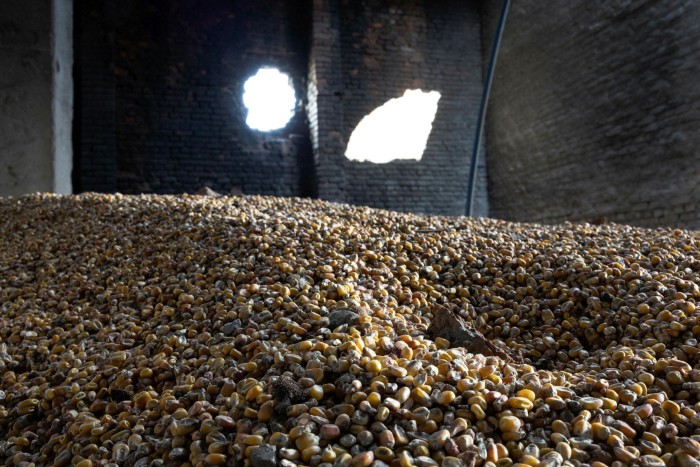[ad_1]
Ukraine has warned that the world faces a critical food shortage unless Russia lifts its Black Sea port blockade, as improvements to other transport options would only enable it to deliver a fraction of its total grain stockpile.
Oleksandr Kubrakov, Ukraine’s infrastructure minister, told the Financial Times that “all of our activity won’t cover even 20 per cent of what we could do through the Black Sea ports”.
Ukraine and its western allies are searching for ways to get up to 20mn tonnes of grain out of the country and clear storage space for this year’s harvest. The crisis threatens tens of millions of people in countries across the Middle East and Africa that rely on Ukraine’s cereals.
Trucks face lengthy delays at the border with Poland and Romania, while moving grain by rail is difficult because trains in the EU and Ukraine run on different gauges of track. Russia has repeatedly bombed the alternative routes, including those leading to Romania by road or rail, where grain is then loaded on barges that sail down the Danube and into the Black Sea.
The EU has simplified its procedures and Ukraine is offering additional guarantees to European barges and trucks after most western insurers shied away because of the risk.
Despite those efforts, Kubrakov said it would prove insufficient. “Everyone is doing superhuman activity, and the [amount exported] is growing every month . . . in the short term it could go up to 30 per cent [of Ukraine’s Black Sea exporting capacity],” he said.
Russia has captured much of Ukraine’s breadbasket in the south and is making progress in the eastern Donbas industrial region, the scene of the fiercest fighting three months into Putin’s invasion of Ukraine.
Since late February, Russia has seized between 400,000 and 500,000 tonnes of grain from occupied territories. Some Ukrainian farms have been hit by air strikes and artillery fire.
Russian president Vladimir Putin has blamed the food crisis on sanctions against Russian exports and said Moscow would only lift the blockade if the restrictions are lifted. On Friday he said in a state television interview: “The problem of exporting grain from Ukraine does not exist.”
Kubrakov warned that Russia’s actions risked creating famine “on a global scale” and Moscow was acting like “total pirates”.
“They don’t care about the lives of these people in Africa,” he said. “They’re telling them: ‘We don’t care about you. We are only worried about sanctions against us. Now you are hostages.’”
Kubrakov said converting a single railway line to the EU standard would cost $2bn to $3bn, with more investments needed to expand capacity at border crossings.

Kyiv has discussed sending up to 4mn tonnes of grain a month via Belarus, which uses the same railway gauges, and on to a port in Lithuania, according to a government briefing document seen by the FT. But the plan is politically unpalatable because Belarusian leader Alexander Lukashenko let Russia use his country as a staging post for its invasion of Ukraine.
Though export capacity via the new routes is rising, EU diplomats estimate that Ukraine can only export about 5mn tonnes of grain by the end of the summer, leaving the rest of the last harvest at risk of rotting and making it more difficult to store this year’s.
“There is no quick solution, unfortunately,” Kubrakov said. Expanding storage capacity would also mean investing billions of dollars in grain silos along the new routes, he added.
The risk to Ukraine’s cereal crops has awakened traumatic memories of the country’s man-made famine of the 1930s when it was part of the Soviet Union. Peasants had their grain taken from them and were confined to their villages, leading to the deaths of 4mn people in what is known as the Holodomor, or death by starvation.
Kubrakov said the consequences of the Black Sea blockade could be even worse. “They did the Holodomor in our country once, yes? Now they have the chance to do a Holodomor on a global scale,” he said.
UN secretary-general António Guterres is leading an effort to unblock the Black Sea ports and secure guarantees from Russia not to attack commercial shipping.
Russian foreign minister Sergei Lavrov said this week that Putin and Turkish president Recep Tayyip Erdoğan had agreed to help de-mine Ukrainian ports, which Kyiv has blocked to guard against a coastal assault.
But Ukraine says Russia has fired on several cargo vessels and mined the sea route blocking their safe passage through the Black Sea, making any potential agreement contingent on third-party guarantees for the ships’ safety.
Kubrakov said the negotiations were Russia’s “last chance to avoid essentially being guilty for the deaths of millions of people on several continents”.
[ad_2]
Source link

